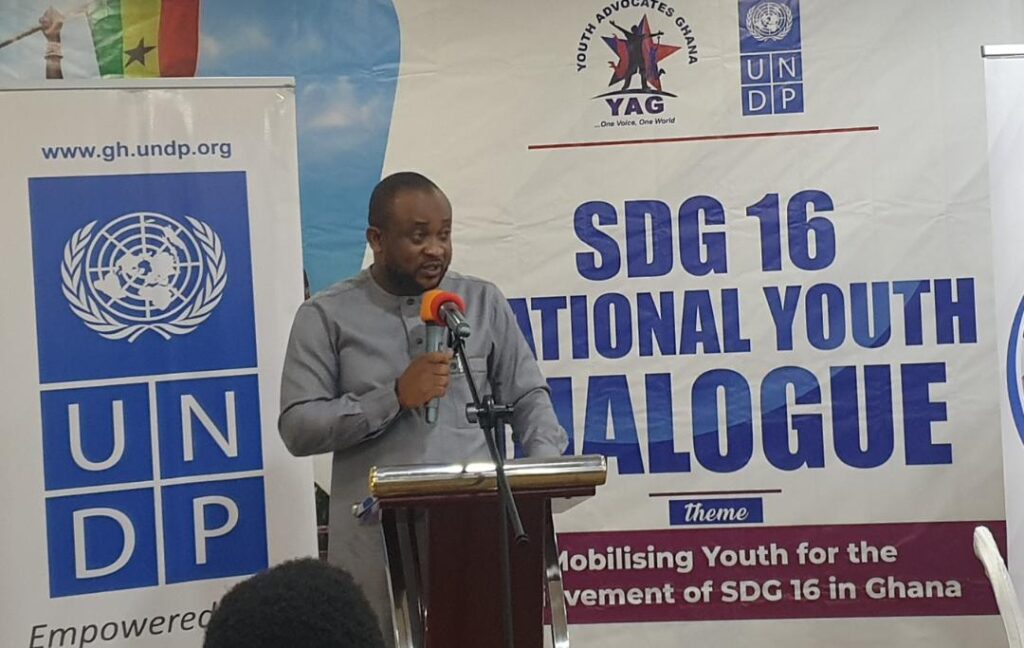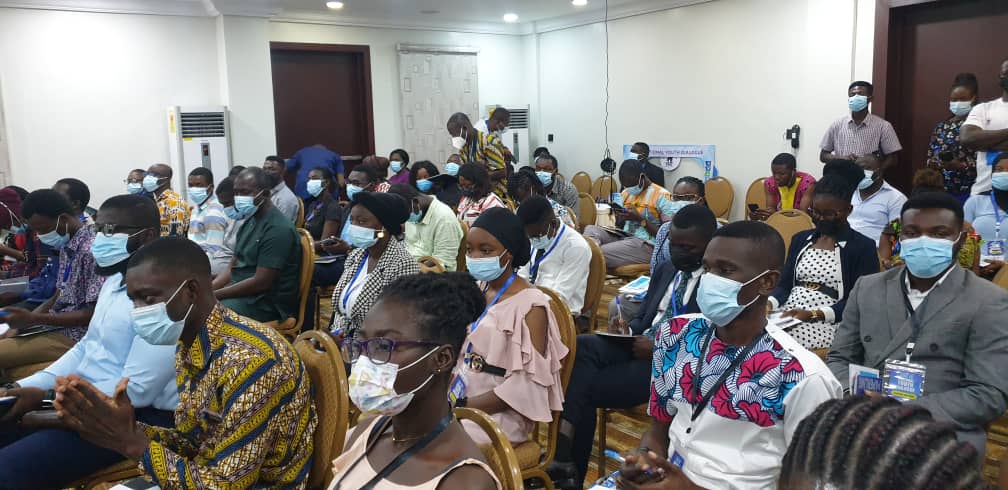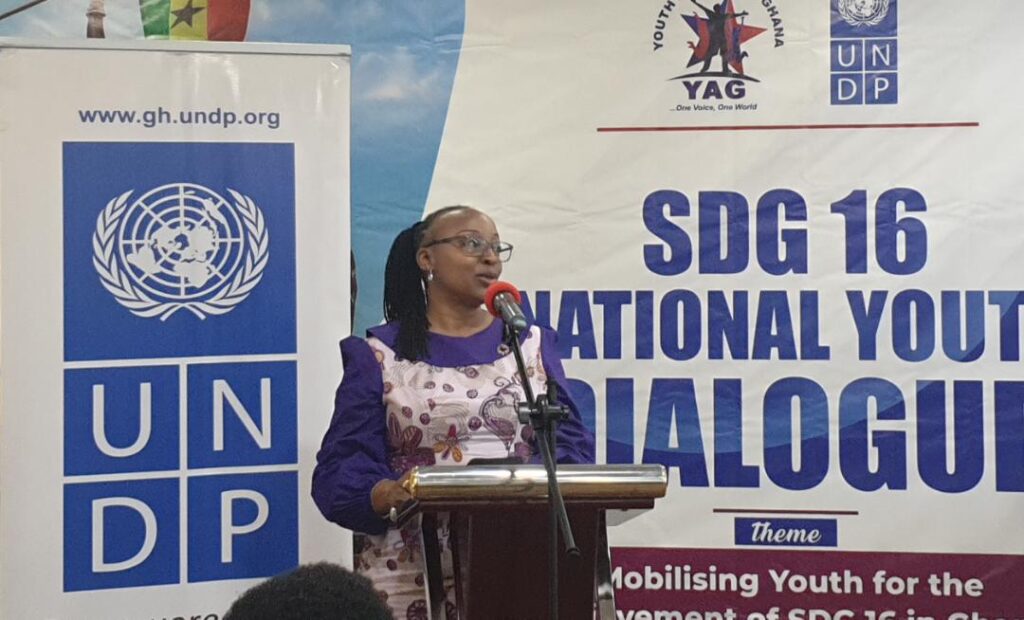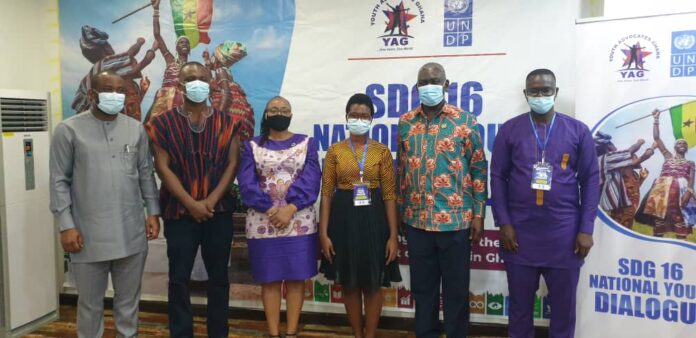Youth Advocates Ghana (YAG) in partnership with the UNDP has held the maiden edition of the Sustainable Development Goal 16 National Youth SDGs Dialogue.
The event brought together young people from all the regions of the country to deliberate on the importance of the youth in achieving SDG 16 which borders on maintaining global peace, establishing strong institutions, and providing justice.
The dialogue also aimed at identifying specific opportunities to bring young people closer to government institutions to promote inclusiveness and meaningful youth engagement in SDG implementation, monitoring, and review, with a focus on SDG16 and related frameworks and share experiences and identify solutions and create avenues for learnings and collaborations including building partnerships for youth organisations working on SDGs 16.
The workshop is expected to enable the participants to have an understanding of efforts by state and non-state actors to localize SDG 16 Compilation of speeches, presentations, and key messages from plenary discussions. CALL TO ACTIONS: Demands by young people on SDG 16
The 2-day SDG 16 National Youth Dialogue held at the Crystal Palm Hotel in Accra was on the theme “Mobilising the Youth for the achievement of SDG 16 in Ghana”.

Speaking at the opening ceremony, the Chief Executive Officer of National Youth Authority Hon. Plus Hadzide observed that the rapid globalisation fostered by the internet and new media while presenting many opportunities and pathways for the youth also carried a threat to the peace we enjoyed.
He noted that “the discrepancy between the rights and opportunities enjoyed by young people elsewhere can also cause frustration amongst young people, particularly in developing countries where these opportunities are largely absent. A frustration which when unchecked can lead to aggression and have security implications.”
Hon. Hadzide suggested that the way to tackle this threat was to address structural issues that impeded the educational, economic, political and social advancement of young people.
Touching on the recent #FixTheCountry campaign, he emphasised that fixing the country was a process that demanded the collective effort of both the government and the people and stressed that several initiatives had and continued to be put in place by the government to stimulate the comprehensive development of the youth such as Free SHS, One District One Factory (1D1F), NYA Youth Parliaments, National Entrepreneurship & Innovation Programme (NEIP), Planting for Food and Jobs (PFJ), Nation Builders Corps (NABCo).
He concluded that the focus on the comprehensive development of the youth was the surest way to involve the youth in keeping the peace, strengthening our institutions and providing justice.
UNDP Resident Representative, Ghana, Dr. Angela Lusigi in her view said, access to quality education is the key to achieving SDG 16, explaining that when young people are financially independent and empowered, they contribute meaningfully to a peaceful and just society.
Emphasizing that, more young men and women should be encouraged to shape peace and development through participating in decision making, and also more active youth participation in peacebuilding.
“While the majority of Ghana’s voter population is youthful (55.1%), only 12 Youth (4.36%) out of the 155 who contested the 2020 general elections are part of the 8th Parliament of the 4th Republic. This fell from 13 youth (4.75%) who won parliamentary elections in 2016[1]”, she said.
Again, she said, UNDP and its partners are committed to empowering young people to be the voice of hope in society and communities across Ghana.
Mr Emmanuel Ametepey, Executive Director Youth Advocate Ghana in his remarks said, the rate at which peace and security are threatened in this century is overwhelming.
“At the turn of the 21st century, there is overwhelming evidence that our everyday existence is a function of peace, security, and strong institutions. Everyday life is unbearable for citizens in countries with war, disturbance, insecurity, and weak institutions.
…Sadly, the youth are either the tools or victims of the unfortunate phenomenon. Globally every country has a story of these unfortunate happenings and ghana through ranked as the second most peaceful country in Africa by the Global Peace Index report 2021, is not isolated because it has its shortcomings”.
Consequently, these systemic failures as a result of weak institutions mostly have youth at the centre of them all and further degenerate extremism and radicalism, which can threaten the very existence of our already fragile democracy.
With that said, there is a need for increased partnership and funding across stakes to embark on conscious and consistent efforts through workable policy and programs to achieve SDG 16.
Adding that, these efforts should be youth-centered and youth-led to promote meaningful youth participation in responding to these challenges.
Mr. Ametepey called on National Youth Authority, National Peace Council, the Traditional and Religious Councils and state institutions to continue to expand and deepen youth engagement initiatives at the district level to ensure no youth is left behind in their efforts to deliver on their policies and programmes.


















































